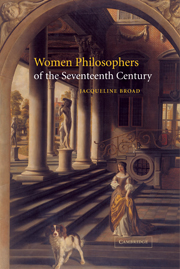5 - Damaris Masham
Published online by Cambridge University Press: 22 September 2009
Summary
In 1696 there appeared a scathing reply to the Astell–Norris letters in an anonymous work titled A Discourse Concerning the Love of God. This short tract was written by Damaris Masham, the daughter of Ralph Cudworth and a close friend of the empiricist philosopher John Locke. Ignoring Astell's criticisms of Norris, Masham attacks both writers for espousing an impractical or ‘unserviceable’ moral theory, rather than one based on common sense. She accuses Astell and Norris of opposing the ‘daily Sense and Experience of all Mankind’. It is obvious, she says, that creatures are designed for a sociable life, and that they can no more love and desire God alone than fishes can fly in the air. In addition to the Astell–Norris letters, Masham targets Norris's ‘Discourse Concerning the Measure of Divine Love’ and Astell's first Serious Proposal to the Ladies.
Masham's remarks sparked defensive responses from both Astell and Norris. In their replies, both writers misattribute the work to Locke – a mistake which is understandable given that Masham's arguments are steeped in the empiricist philosophy of Locke's Essay Concerning Human Understanding (1690). Masham has been variously described as a ‘bluestocking admirer’ of Locke, someone who ‘adopted Locke's views’, a ‘Lockean feminist’, and ‘a clear and ardent exponent’ of Locke's ideas. Others have even maintained that Masham ‘sat loyally’ at Locke's feet as a pupil, or that she wrote ‘under the inspection of Mr. Locke’.
- Type
- Chapter
- Information
- Women Philosophers of the Seventeenth Century , pp. 114 - 140Publisher: Cambridge University PressPrint publication year: 2003



